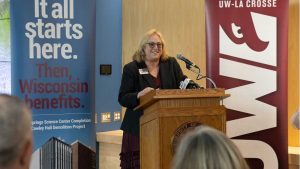District 94, 96 incumbents debate on medical marijuana, minimum wage
October 29, 2014
On Oct. 21, two political debates were held at UW-La Crosse. Before each debate was held, it was mentioned that the first speaker to introduce him or herself was determined by a coin flip. For the first debate, 94th Assembly District Incumbent Steve Doyle debated challenger Tracie Happel, and Doyle introduced himself first.
District 94 includes Onalaska, Holmen, West Salem and Shelby, so for some students who either commute or live off-campus, these politicians may directly effect them.
Within Doyle’s introduction he quoted John F. Kennedy.
The quote he included was, “Let us not seek the Republican answer of the Democratic answer, but the right answer. Let us not seek to fix the blame for the past. Let us accept our own responsibility for the future.”
Doyle and Happel were asked questions from a panel that included members from the League of Women Votes, TV Station WKBT, the La Crosse Tribune, UW-L Department of Political Science and Public Administration, UW-L Student Association and Wisconsin Public Radio. The questions ranged from their views on medicinal marijuana to standardized testing to private school funding.
Doyle also quoted Harry Truman, saying, “It is amazing what you can accomplish if you do not care who gets the credit.”
Doyle stated that he does not care who or what side is behind the idea, if it is a good idea, then he will support it.
The next debate was between 96th district incumbent Lee Nerison, who debated challenger Pete Flesch. The 96th district includes all of Vernon and Crawford counties as well as part of Monroe County.
While both debates held similar questions about “frac,” or silica sand and jobs, the second debate had a larger amount of questions that directly related to a rural and farming area of Wisconsin.
In his opening statement, Nerison said, “My goal when I get to Madison is to, on occasion, piss both sides off.”
Another common theme through the debates was the importance of bipartisanship and what exactly that means. The first debate took more oppositional views on this subject, but the second debate had similar responses to working together.
Flesch said, “It’s just like siblings. You (the oppositional parties) yell at each other, and you scream at each other, but you both want the same thing.”
A topic that has been popular in political debates and fuels people’s fires to an extreme is the debate on whether or not minimum wage should be increased. In the first debate, Doyle was for increasing it for a similar reason as Nerison was.
Nerison said, “I read somewhere that the median age for minimum wage is 26, these aren’t just high school kids or college kids in the summer anymore. These are adults who are supporting themselves and families.”
Flesch and Happel also shared similar views, however, opposing an increase in the minimum wage, stating that it is vital to create more jobs and improve the current jobs first.





